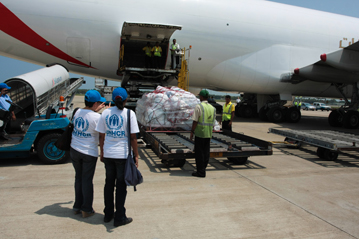First group of Liberian refugees leaves troubled Ivorian area
First group of Liberian refugees leaves troubled Ivorian area

TABOU, Côte d'Ivoire, Jan 17 (UNHCR) - In a breakthrough move today, the UN refugee agency started the emergency repatriation of thousands of Liberian refugees stranded in south-western Côte d'Ivoire. However, the fate of another 5,000 hosted in a camp further north remains in limbo amid futile relocation attempts.
On Friday, 100 Liberian refugees became the first group to leave Tabou, south-western Côte d'Ivoire, for home. From Tabou, five buses took them 30 km to the Cavaly River, which they crossed in canoes back into Liberia. Once they arrived in eastern Liberia's Mariland county, they were taken to a UNHCR transit centre, where they received assistance.
"This is certainly a relief for the refugees, who were growing increasingly anxious," said Panos Moumtzis, UNHCR's Head of Operations in Côte d'Ivoire. "For us too, it represents a first step out of the deadlock we'd been facing for several weeks."
Tensions heightened in Tabou recently when rebels captured the nearby town of Grabo. The local community, which suspected the Liberian refugees of involvement with the rebels and prevented them from leaving, has since been persuaded to let the refugees return home to Liberia.
"The first day of operations was encouraging," said Moumtzis. "We hope to increase the pace of returns in coming days, especially since we expect more refugees to come forward and register to return as news of the operation spreads in the region."
The refugee agency plans to repatriate some 200 Liberian refugees from Tabou every day. So far, nearly 2,400 have registered for the emergency repatriation. Although conditions for return are not ideal in Liberia, which is still in the throes of a civil conflict, the emergency repatriation comes as the most viable option for many Liberians caught in the Ivorian conflict.
Since rebel fighting spread to western Côte d'Ivoire in mid-November, nearly 39,000 Liberians have returned home on their own. Up to 50,000 Liberian refugees are still believed to be in the area.
Meanwhile, UNHCR has received repatriation requests from Liberian refugees in other parts of Côte d'Ivoire, including some 100 in the southern city of Abidjan.
However, for some, repatriation is not an option. More than 5,000 Liberian refugees in Nicla camp, western Côte d'Ivoire, are afraid to go home because of their ethnic background and known opposition to the regime in Liberia. But with rebel fighting threatening to approach the camp, UNHCR has repeatedly appealed to the Ivorian and regional governments to help relocate the refugees to a safer site. These efforts have failed so far.









